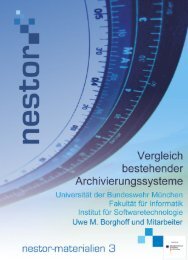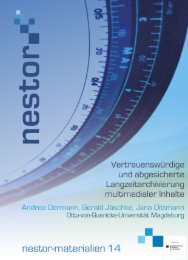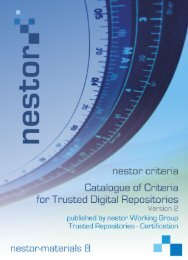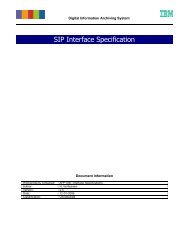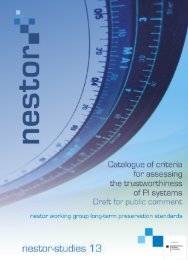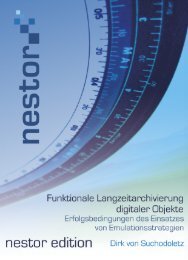offer more than a very general orientation (e.g. 600 Technology; see long item display forhttp://hdl.handle.net/2128/3220 – 25.10.2009). In addition, some (but not the majority of)records contains abstracts to support the discovery and selection of resources. This lackof subject indexing, which also means that JUWEL does not comply with the respectiveDINI criteria at the moment, is problematic for a number of reasons: on the one hand itmakes the discovery and selection of documents increasingly difficult, as users eitherhave to trust that they find what they need by means of a simple keyword search or bybrowsing the collection of the institute which they believe to have published something onthe topic they are interested in. As pointed out by Dr. Wagner, while this might be tolerableas long as one stays within the boundaries of JUWEL, it becomes an immense drawbackas soon as users access the collection not via the local search functionality but search foropen access publications via meta-search engines such as BASE. 123 It is particularly inthese search engines that a subject-based search makes much more sense than a fulltextsearch, which will often return too many hits to be useful. Thus, as soon as userscarry out such subject searches in BASE or similar engines, no hits from JUWEL will bereturned. In addition, from the perspective of long-term preservation, the lack of metadatadescribing the content of a resource by means of a controlled vocabulary is aconsiderable deficit in that such metadata will help to ensure that the designatedcommunity will be able to understand the digital objects in the repository. Thus, inparticular as the amount of publications stored in the repository increases, the use ofclassification and controlled vocabulary for indexing will become indispensable.2.2.3 Qucosa IngestIngest: Receive SubmissionDigital publications are primarily submitted to Qucosa through the web interface(“Eingabeassistent”) 124 , which allows authors to upload their publications and related <strong>file</strong>sin six steps. In some cases <strong>file</strong>s are also submitted via email and uploaded by therepository staff. In addition, submission of CD-ROMs and URLs is possible as well (seeQucosa FAQ 125 ).Both the Qucosa FAQ and the Qucosa Publication Guidelines 126 outline requirementson the submitted <strong>file</strong>s meant to guarantee that the repository receives full control over thesubmitted <strong>file</strong>s. Thus, according to the publication guidelines, submitted <strong>file</strong>s must amongothers fulfill the following criteria: “Die Dateien sollen identifikationsfrei sein und keinenSicherheitsbeschränkungen unterliegen.” This aspect is explained in more detail in theFrequently Asked Questions, which state that <strong>file</strong>s must be <strong>free</strong> from any DRM or othertechnical measures designed to limit access to the <strong>file</strong> or protect the <strong>file</strong> from being copied(password protection, encryption, etc.):123 http://www.base-search.net/ – 03.11.2009.124 http://www.qucosa.de/veroeffentlichen/eingabeassistent/ – 18.10.2009.125 http://www.qucosa.de/faq/ – 03.11.2009. Hereafter cited as Qucosa FAQ.126 http://www.qucosa.de/veroeffentlichen/ – 03.11.2009. Hereafter Cited as Qucosa Guidelines.46
Für die Langzeitverfügbarkeit der auf Qucosa publizierten Dokumente ist die Abgabe vonungeschützten Dokumenten notwendig, d. h. Dokumente dürfen weder verschlüsselt noch mitKennwortschutz versehen eingestellt werden und müssen Ausdrucke und Vervielfältigungenzulassen. Denn wenn eine Datenmigration erforderlich ist, stellen zugriffs- oderpasswortgeschützte Dokumente eine Hürde für die verarbeitende Software dar und macheneine Langzeitarchivierung unmöglich. (Qucosa FAQ)In addition, the FAQ suggest the submission of <strong>file</strong>s in <strong>PDF</strong>/A format. As authors might notread the publication guidelines or the FAQ in all cases, it seems advisable to includeinformation on these issues in the author agreement. 127Thus, if authors follow the guidelines and FAQ, Qucosa obtains full physical/technicalcontrol over the digital objects as required by nestor and TRAC. However, similarly toJUWEL, submitted <strong>file</strong>s are currently not being checked for the presence of DRMmeasures so that it is not entirely certain that the <strong>file</strong>s ingested into the repository areindeed <strong>free</strong> from any technical limitations.While technical control over the submitted <strong>file</strong>s is crucial in order to apply long-termpreservation strategies, in order to carry out preservation measures the repository alsoneeds to have the right to copy and alter the submitted <strong>file</strong>s (i.e. change their <strong>file</strong> format).Accordingly, via the author agreement the SLUB receivesthe non-exclusive (simple) right, to copy, to permanently store and to publish these on theinternet [...]. SLUB Dresden is allowed to rename and convert these publication(s) into otherdata formats, if technical developments would require it. No other content changes will be madeduring conversion.SLUB Dresden is allowed to transfer the publication(s) as electronic <strong>file</strong>s, including allmetadata, to the German National Library, the DFG Special Interest Collection Library, and ifapplicable to other libraries and archives. With the transmission, the aforementioned rights aretransferred to these institutions. (Qucosa author agreement)Authors are required to print and sign the author agreement, and send it to the SLUBDresden before the submission is published. In addition, at the end of the submissionprocess via the web submission form, depositors need to accept the following agreement:Hiermit übertrage ich der SLUB Dresden das Recht, das übermittelte Dokument elektronisch zuspeichern und in Datennetzen öffentlich zugänglich zu machen. Ich versichere, dass mit einerderartigen Veröffentlichung keine Rechte Dritter verletzt werden. Meine Rechte zur Verwertungin einer anderen körperlichen Form bleiben davon unberührt. (Qucosa Eingabeassistent)As suggested above, both agreements should contain a statement making it a submissionrequirement that the submitted <strong>file</strong>s are <strong>free</strong> from DRM or other technical protectionmeasures and/or a note that long-term preservation cannot be guaranteed if depositors donot adhere to this rule.Ingest: Quality AssuranceIntegrity: Currently, only a virus scan is carried out to check the integrity of thesubmitted <strong>file</strong>s. Once, koLibRI is put into use to produce SIPs for the long term archive,the software will carry out format identification, characterization and validation with the127 http://www.qucosa.de/<strong>file</strong>admin/groups/qucosa/<strong>PDF</strong>/Formular_Archivierungs-_und_Nutzungsrechte.pdf;English version available at http://www.qucosa.de/<strong>file</strong>admin/groups/qucosa/<strong>PDF</strong>/Formular_Archivierungs-_und_Nutzungsrechte_englisch.pdf – 18.10.2009.47
- Page 6: AbstractTaking its cue from the inc
- Page 13: and benefit from the development an
- Page 18 and 19: German repositories have already be
- Page 20 and 21: [t]he Open Archival Information Sys
- Page 22 and 23: Thus it seems highly recommendable
- Page 24 and 25: actively pursuing the long-term pre
- Page 26 and 27: Like pedocs, the repository is not
- Page 28 and 29: application for a project grant was
- Page 30 and 31: generating an Archival Information
- Page 32 and 33: Integrity can be defined as “comp
- Page 34 and 35: It is with this step that the metad
- Page 36 and 37: documents submitted to the reposito
- Page 38 and 39: [t]he majority of OCR software supp
- Page 40 and 41: One of the shortcomings of the soft
- Page 42 and 43: set of shared metadata which is the
- Page 44 and 45: document, and that hence the docume
- Page 46: Structural metadata: In DSpace it i
- Page 49: dc.description.provenancedc.descrip
- Page 53 and 54: ecord for a title; although a workf
- Page 55 and 56: Source (where applicable)Publicatio
- Page 57 and 58: checksums. In particular, TRAC requ
- Page 59 and 60: checksums are currently not checked
- Page 61 and 62: 2.4.2 JUWEL Data ManagementThe stru
- Page 63 and 64: Before any SIPs are accepted, the r
- Page 65 and 66: guarantee that documents are “arc
- Page 67 and 68: pedocs is a scholarly open access d
- Page 69 and 70: formats. 151 Although the possible
- Page 71 and 72: While the preferred file format is
- Page 73 and 74: from nestor criterion 8, making it
- Page 75 and 76: preserved for the long term, will h
- Page 77 and 78: It seems that of all three reposito
- Page 79 and 80: associated with them, or has define
- Page 81 and 82: versioning functionality which allo
- Page 83 and 84: communication channels, responsibil
- Page 85 and 86: Works CitedAllinson, Julie (2006):
- Page 87 and 88: DSpace Homepage. http://www.dspace.
- Page 89 and 90: Lynch, Clifford A. (2000): Authenti
- Page 91 and 92: in the EU. Amsterdam: Amsterdam Uni
- Page 93 and 94: Ingestnestor TRAC DINIReceive Submi
- Page 95 and 96: Archival Storagenestor TRAC DINIRec
- Page 97 and 98: Archival Information Update10.4 Das
- Page 99 and 100: Preservation PlanningnestorMonitor



